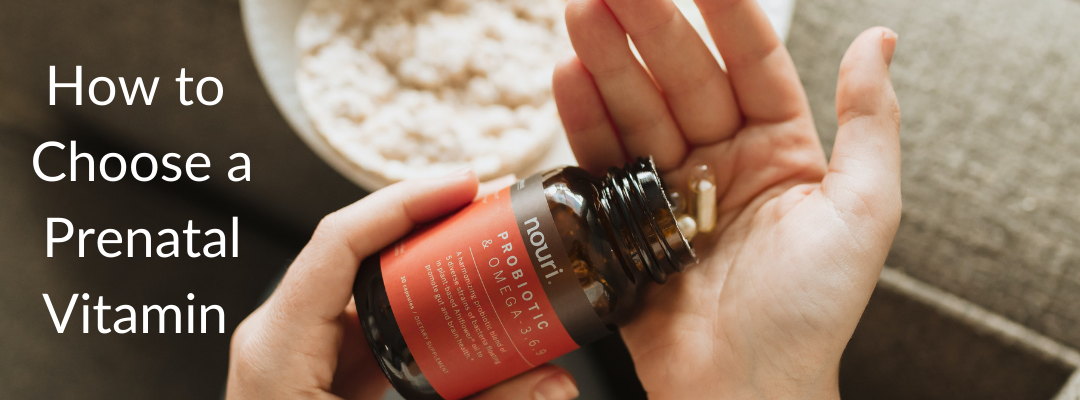If you haven’t already, you should go back and read my earlier blog post “Dietary Supplements; What You Need To Know” before reading this blog! It will give you great background information and an understanding of supplements in general. When it comes to choosing a prenatal vitamin specifically, there are three big factors to look out for and a few other things to keep in mind!
1. All supplements that you consider taking should be third party tested.
Third party testing is a MUST when it comes to all supplements. Because supplements are not truly regulated by the FDA, a company could put out a product and slap an attractive label on it and say it contains all these wonderful ingredients when in fact it does not contain any of them… They could be packing the capsule with damaging fillers to save on cost and include little to none of the actual ingredients they are putting on the packaging.
When a company does third party testing it means they have outsourced an unbiased third party to test their products for quality and efficacy. These third party companies include USP, NSF, and Consumer Labs. You want to ensure your prenatal has one of these companies’ stamps of approval. As with everything, companies can use language to try and make you think that they’re using third party testing when in fact they’re not. So again, make sure you see one of those three companies’ stamps on the bottle or go to the supplement companies’ website and search for what third party testing they have performed.
Something to keep in mind, third party testing only ensures that what the company is saying is on the label is in the actual product. So we need to dig deeper to make sure what is on the label is the best quality!
2. Your prenatal should have the methylated forms of folate & vitamin B12.
Folic Acid is the synthetic version of folate. It needs to go through a multi-step conversion process in the body to become methylfolate, the body’s absorbable and recognizable form of folate. It is estimated that about half of women have some sort of gene variant like MTHFR. The variant makes it difficult for us to methylate. If you have MTHFR it can cause things like miscarriage and birth defects in addition to things like osteoporosis, stroke, diabetes, certain cancers, dementia, depression, and more. When taking things like folic acid, B12, and B6 these need to be methylated in order to be used in the body. Because it is so common to have this variant, it is a safe bet to take the already methylated forms of folate and B vitamins. It is also less work for your body and you are ensuring the usable form of these nutrients right off the bat!
3. Always check the sourcing
Our soils have become depleted over the years. This makes it difficult for us to get an adequate amount of vitamins and minerals from diet alone. When we need to supplement, it is my opinion that we focus on whole food sourcing as opposed to synthetic. There are also different forms of vitamins to be aware of. Here are some examples of what to look for;
I prefer to see retinol over beta-carotene when it comes to vitamin A. Beta-carotene is not necessarily synthetic, however, it needs to be converted into retinol in the body to be absorbed. The whole food name of B9 is folate. The synthetic name is folic acid. A wonderful whole food source of vitamin C is acerola cherry. Synthetic vitamin c is ascorbic acid. When it comes to vitamin D, always look for D3, not D2. D3, the form from animals, is more effective at raising vitamin D levels in the body than the plant form, D2. (1)
Additional things to keep in mind when shopping for a prenatal vitamin:
Many women become deficient in iron during pregnancy (including myself). While this could be for a few reasons, it is most likely due to the major increase in blood volume to, well, grow a human. Iron has a few cofactors that are already in prenatals (B12, B6, folate & vitamin C). Cofactors are like helpers that ensure absorption and utilization of another nutrient when taken together. If your prenatal does not include iron and your doctor or nutritionist recommends that you supplement with it, take it along with your prenatal or find one that has those cofactors included.
Some women may choose to go even more of a natural route and take something like a desiccated beef liver supplement in place of a prenatal. Beef liver is high in iron, selenium, zinc, etc. This can be a beneficial route for some as long as you are working with your doctor/midwife and a nutrition professional.
Some women will benefit from multiple different supplements versus one prenatal. Your care team may recommend you take a DHA/EPA supplement to support the baby’s brain and eye development. This is beneficial to the large majority of pregnant women. However, It is still important to remember that all supplements should be recommended on a bio-individual basis by a trusted practitioner.
Most importantly, you can not supplement your way to health. The best way to get vitamins, minerals, macronutrients, and phytonutrients into your body is through your diet. There are absolutely some instances (such as a prenatal prior to and during pregnancy) where supplements are required. Your nutritionist should always work as part of your care team to make sure you and your baby are supported, healthy, and nourished!
References
- https://pubmed.ncbi.nlm.nih.gov/22552031/

